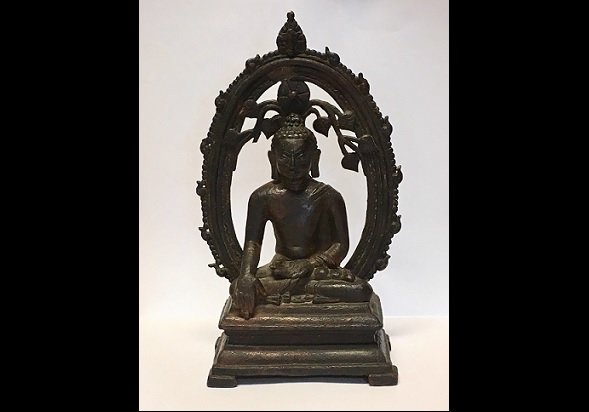A 12th century Buddha statue, which was stolen from India in 1961, was returned to the country by the United Kingdom to coincide with India’s 72nd Independence Day celebrations. The bronze statue with silver inlay was handed over by the British police to Indian High Commissioner YK Sinha at India House in London on Aug. 15.
The statue, a post-Gupta sculpture showing the Buddha seated in the Bhumisparsha Mudra pose, was one of the 14 idols that were purloined from the Archaeological Museum in Nalanda in 1961. Since then it is said to have changed hands several times before appearing at the European Fine Arts Fair at Maastricht in the Netherlands, in March, where it was spotted by Lynda Albertson of the Association for Research into Crimes Against Art (ARCA). Albertson got in touch with Vijay Kumar from the India Pride Project to confirm the identification, and informed the police.
“I identified the piece one day before the fair closed,” Albertson told CNN. “That’s insufficient time to get ILORs (International Letters of Request) for assistance from India to Dutch police to seize the piece. So the dealer was informed that there would be an investigation in their home country, the UK, and agreed to take the object off sale while the police conducted their investigation.”
The owner and the dealer were then made aware of the origin of the statue and they agreed to cooperate with Met’s Art and Antiques Unit in the due process of handing over the statue, the Metropolitan Police said in a statement.
The police decided to hand over the statue to Indian officials as a part of the country’s Independence Day ceremony on Aug. 15.
Sinha, appreciated the gesture as “wonderful,” and called the occasion a tribute to his own roots in Bihar, PTI reported.
“I hope it will now go back to where it originally belongs… On our Independence Day, it (return of the statue) highlights the multi-faceted cooperation between our two countries,” Sinha said, during a tricolor-hoisting ceremony to commemorate India’s 72nd Independence Day at the Indian High Commission in London.
“This case has been a true example of co-operation between law enforcement, the trade and scholars. Particular credit must go to the eagle-eyed informants who made us aware that the missing piece had been located after so many years,” Detective Constable Sophie Hayes, of the Met’s Art and Antique Unit, said in a statement.
Michael Ellis, UK Minister for Arts, Heritage and Tourism, stated: “As we celebrate India’s Independence Day, I am proud to highlight the latest example of the UK’s cultural diplomacy in action.” He added that Britain is one of the first countries to recover one of the 14 elusive Buddha statues stolen from Nalanda nearly 60 years ago.
In a blog post, Albertson hoped that other countries would follow suit over returning stolen artifacts. “While I, like Vijay am overjoyed that this stolen Buddha is finally going home, another similar to it, identified in February and stolen during the same theft, still sits at the Los Angeles County Museum of Art (LACMA) in Los Angeles, California,” she said. “The question remains, if the US-based museum will be as forthcoming as this collector and UK dealer.”
